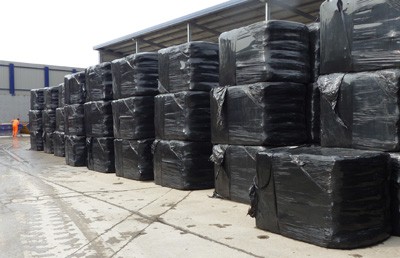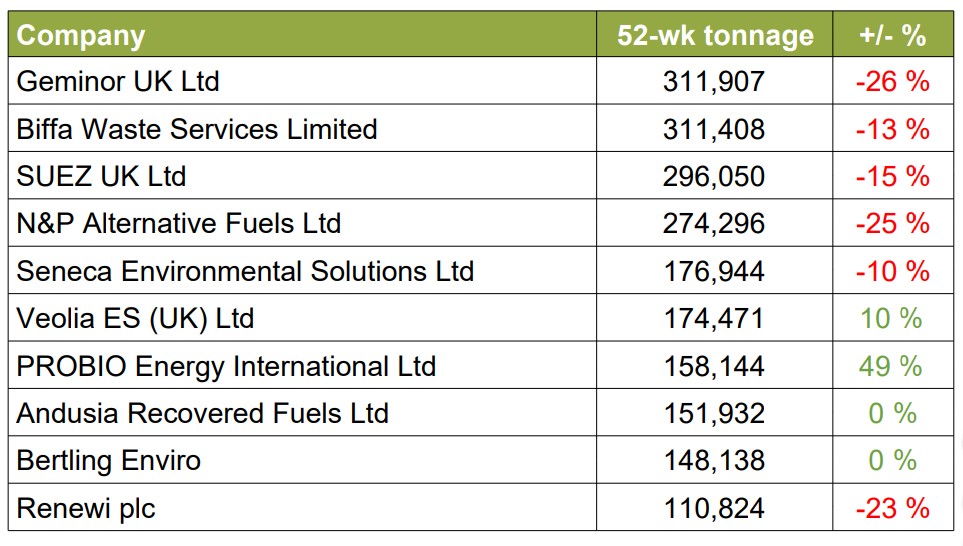Exports of refuse derived fuel (RDF) from the UK fell by 13% in 2019, according to a report released by environmental consultancy Footprint Services.
Based on official Environment Agency statistics, the report showed that the overall tonnage exported from England decreased from 3,137,266 tonnes in 2018 to 2,714,225 in 2019.
The 2019 figure is in line with letsrecycle.com’s forecast last month, based on statistics for the year to November. We estimated that 2,617,210 would be exported, less than 100,000 tonnes out (see letsrecycle.com story).
The reduction comes amid much uncertainty in the industry, with the Netherlands introducing a €32 tax on the import of waste, along with Sweden, which is set to bring in a tax of around £6 in April.
Speaking with letsrecycle.com, Andrew Gadd, company manager at Footprint Services, said: “We wait to see what the future holds. We are all aware of the uncertainty in the markets and there is simply not enough margin for this to be absorbed by waste producers. The costs at the moment aren’t too much different to landfill.
“I imagine there will be a three-way split of the taxes, with the incinerators nudging down their gate fees, and the waste producers and exporters also picking up some of the extra cost.
“Waste producers do have an ethical standpoint, they want to dispose of their waste in the best way possible by the terms of the waste hierarchy, but ultimately the bottom line is cost.
“However, I can’t see a situation where the material they send won’t go to the likes of AEB, and others on the continent. They like UK waste, it is nicely packaged and reliable. My feeling is that they will do whatever they can to get UK waste. I think there will be a degree of flexibility on the continent.”
As outlined in the table below, the biggest importers of UK RDF all saw a fall in 2019, with the Netherlands taking 11% less RDF and Germany seeing a 23% fall.
Interestingly, Bulgaria saw the amount of RDF they imported rise from 2018, taking 79,297 tonnes in 2019 as compared to 31,336 in 2018.
Destinations
The statistics show that the most popular destination for exports of RDF was the Netherlands, with 1.16 million tonnes making its way across the channel. This represents a drop in 11.2% from 2018.
However, exports to the country increased marginally from December to November 2019, from 77,520 tonnes to 87,686 tonnes.
The next most popular countries where RDF was exported were Sweden, Germany and Denmark, who took 559,000 tonnes, 397,000 tonnes and 141,000 tonnes respectively.
In terms of exporters, Geminor was the highest, followed by Biffa, SUEZ UK Ltd and N&P Alternative Fuels.
James Maiden, country manager at Geminor UK, said: “2019 was a challenging market for UK export, mostly due to issues surrounding Brexit, the Dutch temporary import restrictions and an increase in UK domestic capacity and facilities.
“We expect these conditions to continue into 2020, where the Dutch and Swedish tax announcements will impact on UK flows.”
Imports
Meanwhile, Dutch firm Attero BV was said to have imported the most RDF of any country during the year, having taken 375,912 tonnes. This still represented a 13% drop on 2018.
The company to have imported the second most was another Dutch waste management service, AVR Afvalverwerking BV, as was the third, Afval Energie Bedrijf (AEB).
They imported 194,880 tonnes and 188,974 tonnes respectively.
The post Drop in 2019 RDF exports confirmed appeared first on letsrecycle.com.
Source: letsrecycle.com Waste Managment





